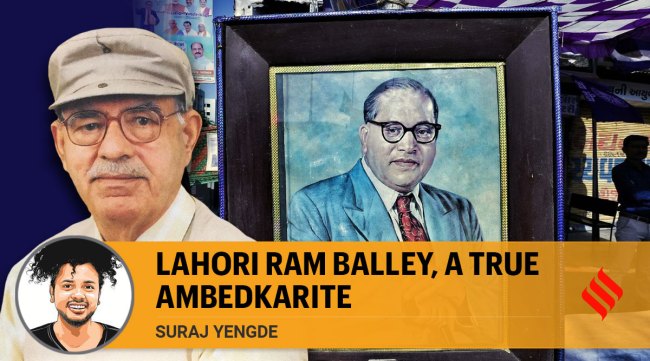Opinion Lahori Ram Balley, a true Ambedkarite
Lahori Ram Balley of Jalandhar is an important link in the archive of India’s history who witnessed the prophet of the millions who were subjugated under the tyranny of the caste system.
 Lahori Ram Balley of Jalandhar is an important link in the archive of India’s history who witnessed the prophet of the millions who were subjugated under the tyranny of the caste system.
Lahori Ram Balley of Jalandhar is an important link in the archive of India’s history who witnessed the prophet of the millions who were subjugated under the tyranny of the caste system. Prophets are born once in a rare epoch. They serve the people and arduously work to take them out of their misery. Reverentially, the prophet’s life story becomes inspirational, and thus each move of theirs is carefully recorded and repeated in morning prayers to recall their compassionate work. To honour their monumental work, the faithful embalm the memories of their liberator. They are immortalised in engravings, drawn in paintings, written in paeans and poems.
Each generation tries to find the closest link to the prophet. It could be anything or anyone. If the link is alive and lives by the memories of the prophet every day, that person is a member of the sangha that has heard the noble words of the prophet and seen the noble deeds.
Lahori Ram Balley of Jalandhar is an important link in the archive of India’s history who witnessed the prophet of the millions who were subjugated under the tyranny of the caste system. Balley saw Dr B R Ambedkar in the flesh and witnessed him several times advocating for the rights of his people.
Balley is no ordinary name. It is a heavy title in the Ambedkarite circles, nationally and internationally. Balley’s family was a direct victim of Partition. They were among a lot of those untouchables whose condition was so fragile that Dr Ambedkar asked Prime Minister Nehru to intervene to ensure the safe passage of the outcastes.
Born on July 20, 1930, Balley grew up in Punjab and secured a job as a copy holder in Delhi. There, he would meet Dr Ambedkar and other second-rung leaders. Sitting behind those leaders, the young Balley would carefully register the conversations his leader would have with his associates Sohanlal Shastri, Shankaranand Shastri, Nanak Chand Rattu and other visitors.
On September 30, 1956, after a meeting of the Scheduled Caste Federation, while seated at his 1, Harding Avenue bungalow, Dr Ambedkar felt sudden unease and was soon escorted for medical attention. Seeing that empty chair, the worried Balley promised his prophet that he will continue his mission, the ‘Ambedkari Mission’.
Balley was a witness to the construction of Ambedkar Bhavan in New Delhi and the establishment of the Republican Party of India in Punjab, of which he became general secretary. He went to jail for the land rights satyagraha led by B K Gaikwad, became a key member of the Samata Sainik Dal, and led the movement to spread Dhamma in Punjab.
However, the most important work that he religiously carried out was publishing Bheem Patrika, an Urdu and Punjabi journal started in 1958. Since 1965, the Bheem Patrika has published in Hindi, with circulations across India and abroad. Additionally, Mr. Balley’s Bheem Patrika Publications published seminal writings of several anti-caste writers and by himself.
For his courageous stand, Balley was frequently sent to jails. At least 20 cases were registered against him for his Ambedkarite writings and, at other times, for leading democratic protests.
His writings spared none, inside and outside. An avid reader and writer of Urdu, Punjabi, Hindi and English, Balley wrote and translated over 105 books. A couple of his titles were banned, including the famed Hinduism: Dharam ya Kalan?.
Balley is a loud voice in a region mired by the factionalism of various faiths in Punjab. There is indeed something energetic about Punjab’s land. It gave birth to Nanak. It is the same land that saw the Sikh empire led by Maharaja Ranjit Singh. However, it is also the same unfortunate land that contaminated this holy legacy by the dirt of caste, dividing the seekers of salvation in the region. The Punjab Land Alienation Act of 1900 deprived the Dalit landless labourers from owning any land, which resulted in perpetual degradation and the rise of a hoodlum Jat pride, dishonouring the wisdom of the Gurus. Yet, in this land, we see Balley exuding the energy of the fighters befitting the region and his community.
When I went to visit him in Jalandhar a few years ago, he was ever ready to discuss politics and history. His tone would appear sloganeering even when he was casually chatting about his work and Ambedkarism.
Balley is a precious testimony of a generation that is a strong bridge to the past. Despite his monumental contributions, Balley remains marginalized from literary and other historical struggles. While his life is a token of immense vanity for India, he is disregarded by the Indian government’s award-giving bodies, the Sahitya Parishads, or even universities that have not considered awarding him a doctorate. It feels disrespectful to address Mr. Balley without an honourable Dr. prefix. A polyglot writer, editor, publisher, politician, organizer and activist, Balley is a living bookshop of Ambedkarite and Buddhist tradition. Awarding Balley will honour India.
Balley’s energy is anarchic, his demeanour revolutionary, and his conduct democratic, for he is an emblem of a generation’s testament to history. Mr Balley is a true hero and deserves the rightful honour in Dalitality’s profile for his courageous work in transforming journalism, publishing and the intellectual movement.
If the government doesn’t, I hope to establish an institution and an award in Balley’s name that will honour his life and work.
Suraj Yengde, author of Caste Matters, curates Dalitality, and is currently at Oxford University






